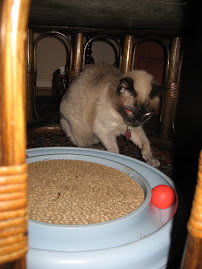
New Year’s Greetings to all readers of this blog.
Today, January 10, 2010, I went back to the gym after an absence of four months. Does this story sound familiar? YMCA membership for ten years: Average actual use of YMCA-- approximately ten hours per year. In other words, some years, I’m a real go-getter and I go multiple times a week; I use the treadmill; the weight machines; take an aerobics class. Then there are the years where I don’t step foot inside the gym. That’s my “track record” with formal physical exercise. If I include those other activities in life which work off calories and build body muscle, such as gardening, vacuuming, or walking my dog, my score would improve somewhat but nothing to put me in the boot camp category. My motivation to exercise comes and goes, according to what else is going on in my life.
The journals are full of articles about how we can retain our cognitive functions, most recently in Time magazine, Jan 18, 2010, “Workouts For Your Brain,” by Bonnie Rochman. I’ve been doing the cross-word puzzles for about ten years. My friends are doing their daily Sudokus. I know folks who are studying a foreign language. Well, the data tell us that in addition to activities like those I just mentioned, two of the most important things one should be doing to remain at top cognitive functioning are to engage in physical activity and to remain socially active.
Isn’t that a nice prescription for mental and physical wellness? Take a walk every day and go out with your friends at least three times a week. How hard is that?
Today, January 10, 2010, I went back to the gym after an absence of four months. Does this story sound familiar? YMCA membership for ten years: Average actual use of YMCA-- approximately ten hours per year. In other words, some years, I’m a real go-getter and I go multiple times a week; I use the treadmill; the weight machines; take an aerobics class. Then there are the years where I don’t step foot inside the gym. That’s my “track record” with formal physical exercise. If I include those other activities in life which work off calories and build body muscle, such as gardening, vacuuming, or walking my dog, my score would improve somewhat but nothing to put me in the boot camp category. My motivation to exercise comes and goes, according to what else is going on in my life.
The journals are full of articles about how we can retain our cognitive functions, most recently in Time magazine, Jan 18, 2010, “Workouts For Your Brain,” by Bonnie Rochman. I’ve been doing the cross-word puzzles for about ten years. My friends are doing their daily Sudokus. I know folks who are studying a foreign language. Well, the data tell us that in addition to activities like those I just mentioned, two of the most important things one should be doing to remain at top cognitive functioning are to engage in physical activity and to remain socially active.
Isn’t that a nice prescription for mental and physical wellness? Take a walk every day and go out with your friends at least three times a week. How hard is that?
According to the website for Alzheimer’s Prevention, “exercise strengthens the pumping force of your heart, increases blood flow to your brain, increases exercise tolerance, reduces body weight, lowers blood pressure, reduces bad cholesterol (both LDL and total), increases good cholesterol (HDL), and increases insulin sensitivity, all of which enhance health and reduce the risk for diseases that can affect brain functioning, such as cardiovascular conditions.” http://alzheimers.about.com/od/prevention/f/physexercise.htm
John Ratey, MD., author of Spark: The Revolutionary New Science of Exercise and the Brain, tells us that exercise stimulates our gray matter to produce “Miracle-Gro for the brain.” If ever I needed to find an excuse for exercising—this is the best one yet. If research shows that people who exercise regularly are less likely to fall victim to dementia and Alzheimers Disease, what more can anyone say to encourage you and me to get out there and walk on the treadmill, or walk the neighborhood with friends, or lift those free weights that have been sitting idle for two years? Just 30 minutes a day is all it takes. After watching the movie Iris last night about Iris Murdoch’s struggle with Alzheimer’s, I know that I would sure like to try some preventive tactics.
One more quote from John Ratey: "Going out for a run is like a little Prozac and Ritalin. We feel more focused, calm and motivated afterward. The more activity you are doing, the less cognitive decline." Quoted by Simon Usborne on John Ratey website, article “Third Age: Health and Wellness.” http://johnratey.typepad.com/blog/2008/04/third-age-healt.html







No comments:
Post a Comment